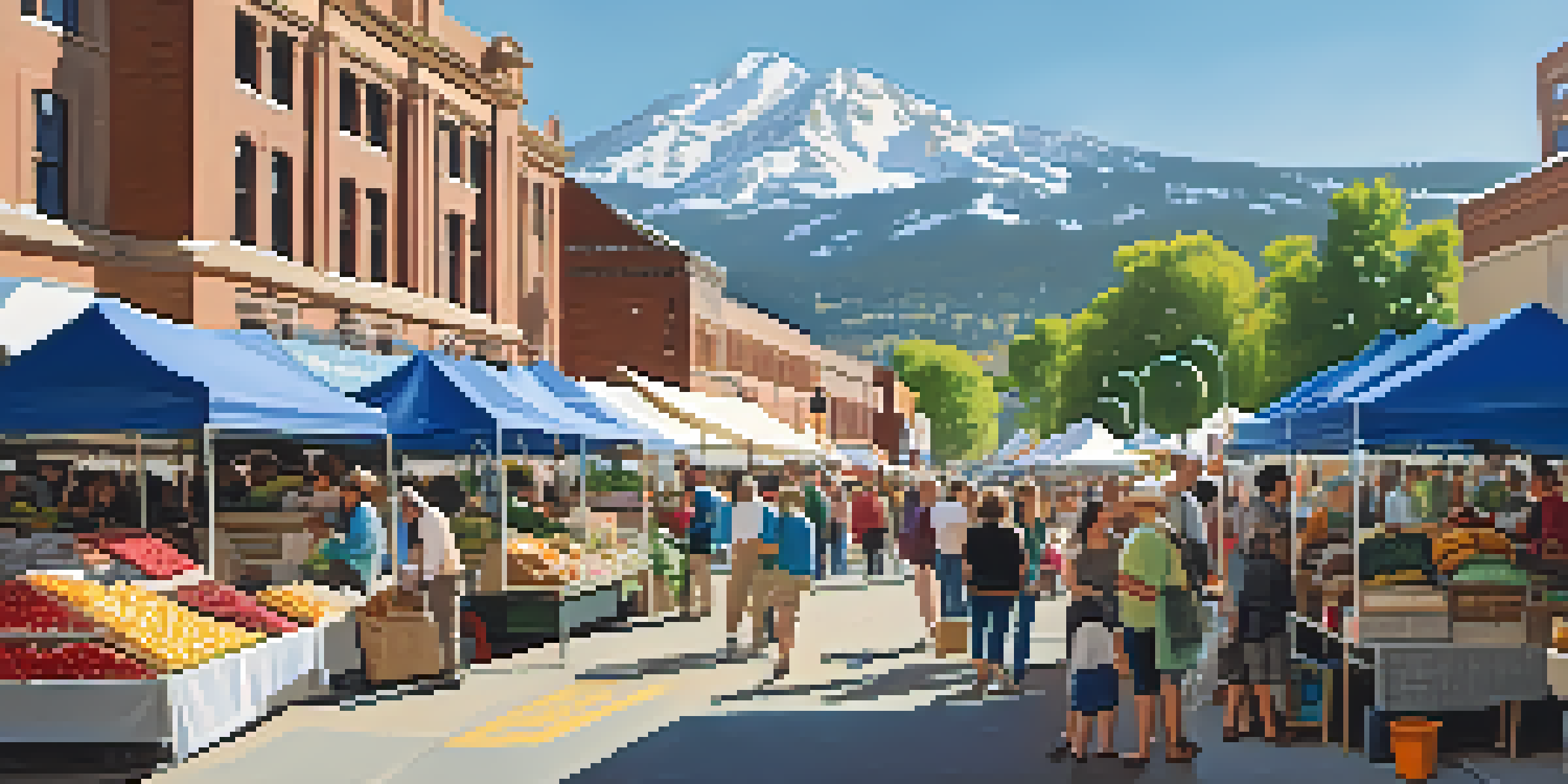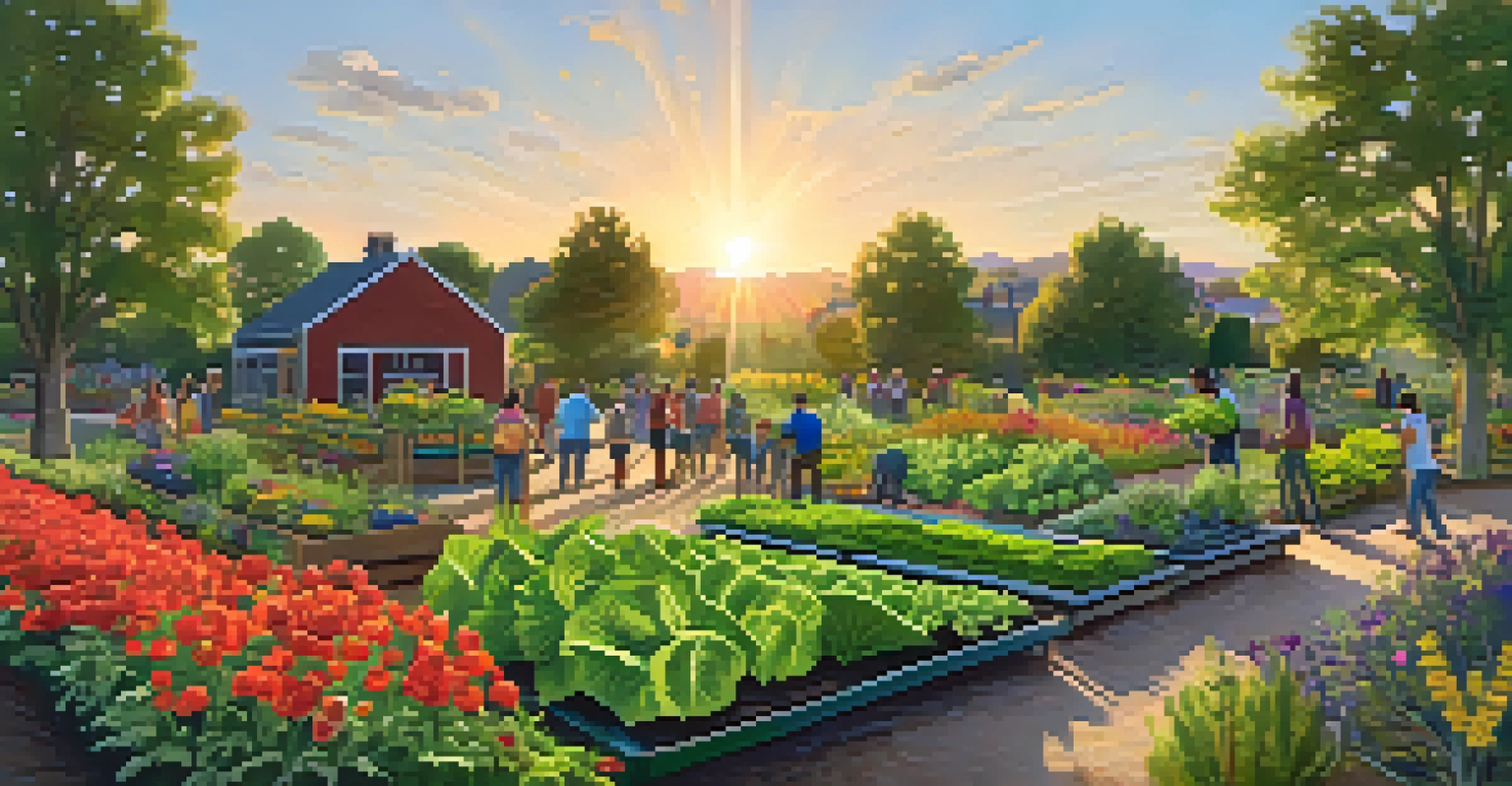From Farm to Plate: Boulder's Commitment to Local Food

Understanding Boulder's Local Food Scene
Boulder, Colorado, is renowned for its vibrant local food culture. This city has embraced the farm-to-table movement, where fresh, locally-sourced ingredients are prioritized in restaurants and homes alike. From farmers' markets to community gardens, Boulder's commitment to local food is evident everywhere you look.
Eating locally is not just a trend; it's a way to connect with the land and the community.
The local food scene is not just about eating fresh; it's about creating a community that values sustainability and health. Many residents have made it a lifestyle choice, understanding the environmental benefits of supporting local agriculture. By choosing local, they reduce the carbon footprint associated with transporting food long distances.
This dedication to local food fosters connections between consumers and farmers, creating a sense of trust and transparency. Knowing where your food comes from can make a meal feel much more meaningful, as it’s not just about nourishment but also about supporting the local economy.
Boulder Farmers' Markets: A Hub of Freshness
One of the best places to experience Boulder's local food culture is at the farmers' markets. These bustling markets offer a wide variety of fresh produce, meats, dairy, and artisanal goods, all sourced from local farmers and producers. Every Saturday, you can find residents gathering to shop, chat, and enjoy the vibrant atmosphere.

Shopping at farmers' markets not only provides access to fresh ingredients but also supports local farmers and artisans. This direct connection helps sustain the local economy and encourages the growth of small-scale agriculture. Plus, consumers can often ask farmers questions about their practices, gaining insights into how their food is grown.
Boulder's Commitment to Local Food
Boulder embraces the farm-to-table movement, prioritizing fresh, locally-sourced ingredients and fostering community connections.
The experience of walking through the market, tasting samples, and getting to know the people behind the food is truly unique. It transforms grocery shopping into a social activity, making it an important community event rather than just a chore.
Community Supported Agriculture (CSA) Programs
Community Supported Agriculture (CSA) is another vital component of Boulder's local food movement. These programs allow consumers to buy shares of a farm’s harvest in advance, ensuring they receive fresh produce throughout the growing season. This model not only supports farmers financially but also fosters a sense of partnership between growers and consumers.
The future of food is local, sustainable, and community-driven.
Participating in a CSA means you’ll often receive a variety of seasonal produce, which encourages families to try new recipes and ingredients. It’s a delightful way to connect with the rhythm of the seasons and appreciate the diversity of local agriculture. Plus, it often leads to discovering new favorite foods that you might not have picked up otherwise.
CSAs also promote sustainable farming practices by supporting farmers who prioritize environmental stewardship. This commitment to local and sustainable food systems is essential for maintaining the health of the soil, air, and water, ensuring future generations can enjoy the same bounty.
Local Restaurants Prioritizing Sustainable Ingredients
Boulder's restaurants are increasingly committed to sourcing local and sustainable ingredients. Many eateries have built relationships with nearby farms, allowing them to serve dishes that showcase the freshest produce available. This not only enhances the flavor of meals but also aligns with the community's values around health and sustainability.
Restaurants like 'The Kitchen' and 'Frasca Food and Wine' are perfect examples of how Boulder's culinary scene embraces local sourcing. Their menus change seasonally, reflecting what’s available from local farms and ensuring that diners enjoy the best of what Boulder has to offer. This approach not only supports local agriculture but also adds a unique touch to the dining experience.
Farmers' Markets Foster Community
Boulder's farmers' markets serve as vibrant hubs where residents shop for fresh produce while supporting local farmers and artisans.
By dining out at these establishments, patrons are not only indulging in delicious food but also participating in the local food movement. It’s a win-win situation: enjoying a fantastic meal while supporting the environmental and economic health of the community.
The Role of Education in Promoting Local Food
Education plays a crucial role in Boulder's commitment to local food. Various organizations and schools offer programs that teach residents about nutrition, cooking, and the importance of supporting local agriculture. These initiatives help empower individuals to make informed food choices and foster a greater appreciation for local food systems.
Workshops and cooking classes that focus on seasonal ingredients encourage people to experiment in the kitchen. By learning how to prepare meals with fresh produce, participants become more inclined to shop locally and support farmers. This hands-on approach makes the connection to local food even stronger.
Additionally, educational programs in schools teach children about where their food comes from and the benefits of eating fresh, local produce. This early exposure can inspire a lifelong commitment to healthy eating habits and support for local farmers.
Sustainable Practices in Local Farming
Local farmers in Boulder are embracing sustainable practices to ensure their operations are environmentally friendly. Techniques like crop rotation, organic farming, and permaculture not only help maintain the health of the land but also improve the quality of food produced. This commitment to sustainability is a cornerstone of Boulder's local food movement.
Many farms in the area prioritize regenerative agriculture, which focuses on restoring ecosystems and improving soil health. This method not only benefits the environment but also results in more nutritious food for consumers. It’s a holistic approach that sees the farm as an interconnected system rather than just a place to grow crops.
Education Promotes Local Food Choices
Educational programs in Boulder empower residents to make informed food choices and appreciate the benefits of supporting local agriculture.
By supporting these sustainable farms, consumers are directly contributing to the preservation of natural resources and biodiversity. It’s a powerful reminder that our food choices have far-reaching impacts on the planet and the community.
Challenges Facing the Local Food Movement
While Boulder's local food scene is thriving, it does face some challenges. One significant obstacle is the rising cost of land, which can make it difficult for new farmers to enter the market. As urban development expands, preserving agricultural land becomes even more crucial to maintaining the local food supply.
Another challenge is climate change, which can affect crop yields and food production. Farmers must adapt to changing weather patterns and find innovative solutions to ensure their operations remain viable. This unpredictability can create uncertainty for both farmers and consumers.

Despite these challenges, the community's commitment to supporting local food continues to grow. By advocating for policies that protect local agriculture and encouraging sustainable practices, Boulder is working to overcome these hurdles and maintain its vibrant food culture.
The Future of Boulder's Local Food Movement
Looking ahead, Boulder's local food movement shows no signs of slowing down. With a strong foundation built on community support and sustainable practices, the future is bright for farmers, consumers, and restaurants alike. As awareness of the benefits of local food continues to rise, more people are likely to participate in this movement.
Emerging technologies, such as vertical farming and aquaponics, may also play a role in shaping the future of local food. These innovations can help maximize space and resources, making it easier for urban farmers to thrive. As the movement evolves, it will be exciting to see how these advancements enhance Boulder's commitment to local food.
Ultimately, Boulder's dedication to local food is a testament to the power of community. By continuing to support local farmers, educate the public, and promote sustainable practices, Boulder is ensuring that the farm-to-table movement remains alive and well for generations to come.